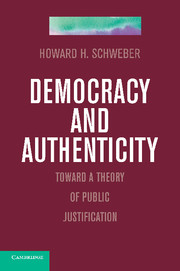Book contents
- Frontmatter
- Contents
- 1 Introduction
- Part One The Case for Constraint
- 2 Three Versions of the Case for Constraint
- 3 Subjective Standards and the Problem of Deliberative Perfectionism
- 4 Liberalism and the Problem of Authenticity
- 5 Further Reflections on Authenticity
- 6 The Scope of Constraint
- Part Two Responding to the Case for Inclusion
- Bibliography
- Index
- References
5 - Further Reflections on Authenticity
from Part One - The Case for Constraint
Published online by Cambridge University Press: 05 November 2011
- Frontmatter
- Contents
- 1 Introduction
- Part One The Case for Constraint
- 2 Three Versions of the Case for Constraint
- 3 Subjective Standards and the Problem of Deliberative Perfectionism
- 4 Liberalism and the Problem of Authenticity
- 5 Further Reflections on Authenticity
- 6 The Scope of Constraint
- Part Two Responding to the Case for Inclusion
- Bibliography
- Index
- References
Summary
In the last chapter, I reviewed a number of arguments from consequences and fairness that address the idea of moving beyond a politics of authenticity. These arguments are part and parcel of the case for constraint, which asserts that within the scope of public political justification, citizens must be willing to put aside even authentic elements of their own subjective beliefs about the accessibility of reasons out of respect for an objectively evaluated understanding of the beliefs and understandings of others. The case for objective, listener-oriented standards and the case for a liberalism beyond the politics of authenticity are two sides of the same coin. One cannot ask a constrained speaker to accept the necessity of adopting the standards of accessibility of others without asking him to be willing to set aside a desire for deeply authentic politics, and one cannot ask citizens to forego the politics of authenticity unless they are first persuaded of the need to consider the significance of political justifications from the perspective of others. Both of these elements are equally necessary implications of a commitment to the values of consensus liberalism.
In this chapter, I continue to present the case for removing the politics of authenticity from the vocabulary of liberalism. Where in the last chapter I focused on arguments from fairness and consequences, in this chapter, I examine two arguments from epistemology – epistemological perfectionism and epistemological populism – and then return to a particular case of the argument from consequences, the case of war. The chapter closes with some reflections on the relationship between the appeal to authenticity and a liberal conception of civil society, a theme that connects the arguments from consequences, fairness, and epistemology in these two chapters.
- Type
- Chapter
- Information
- Democracy and AuthenticityToward a Theory of Public Justification, pp. 130 - 162Publisher: Cambridge University PressPrint publication year: 2011



